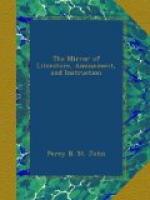My intent is to hail Mrs. Wood’s appearance and success at the opera as an auspicium melioris aevi, as the dawn of a coming day, when the staple commodity of our Italian opera shall be furnished by our own island, instead of being imported from a country which, I boldly assert, does not produce either superior voices, or better educated musicians than our own—nay, so well educated. Has Italy ever furnished us with such a tenor singer as Braham; the Braham that I am, per mia disgrazia, qualified, by age, to remember; the Braham of 1801? Has Italy ever sent us a prima donna, considered as a singer only, like Billington? On the contrary, do we not, in gauging our progressive musical importations, subject them to immediate comparison with Billington and Braham? And who, except Catalani and Fodor, Siboni and Donzelli, would bear that comparison? The French, the Germans, cultivate assiduously native talent, and we import, now a Fodor, and now a Sontag; we English alone persist in the sapient policy of making the exclusion of the native artist from the highest point to which his ambition could be directed, the rule; and his admission, the exception which the grammarians say (though my grammar-master never could drive it into my head why) proves the rule.
But I shall be told that few of our native artists can speak the Italian language, or sing Italian music, and more especially recitative. My answer is, let them once know that the mere circumstance of their being English born does not shut the stage-door of the King’s Theatre against them, all will look up to its boards as the goal of their ambition, and the study of Italian and recitative will form an important part of every singer’s education. Another common objection is, that we cannot acquire the purity of pronunciation required by the refined audience of the King’s Theatre. I trust it is no heresy to say that I am somewhat sceptical as to the powers of euphoniacal criticism which that audience possesses. If one in ten, even of the box company, can really distinguish the true bocca romana from the patois of the Venetian gondolieri or the Neapolitan lazzaroni, it is, I am persuaded, as much as the truth will justify. In fact it is not the audience that is so critical: it is the associated band of foreign parasites who attach themselves to our aristocracy with the tenacity of leeches, as purveyors des menus plaisirs, and whose interests are vitally concerned in excluding English talent, and negotiating the concerns of foreign artists, that raise the cry of “pronunciation.” It is these gentry who, in phrase that a Tuscan would spurn at, and in a brogue from which a Roman, ear would be averted with disgust, assure our fashionable opera goers that we poor Englishers cannot learn to pronounce Italian.




